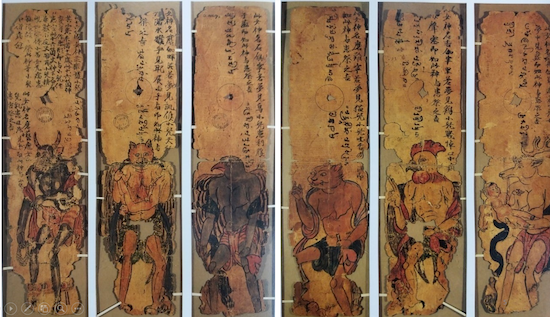Book Culture in Buddhism and Beyond lecture given by Lin Hsin-Yi, Fo Guang University, Taiwan
This talk will explore the spread of the cult of the fifteen children-protecting deities by examining one scripture, the Dhārāni Sūtra for Protecting Children Taught by the Buddha (T. 1028A), and its manuscripts, prints, and related rituals that circulated in medieval Dunhuang and Japan. The scripture was translated in the sixth century and included in Chinese Buddhist Canons. It describes the methods for protecting pregnant women, embryos and children. It also informs its readers about various features of demons who may cause harm and describes the symptoms exhibited by infected children. Furthermore, it offers spells and a set of rituals to exorcize the demons, converting them into protective deities. Seven manuscripts of this scripture survive from medieval Dunhuang. The postscripts left on these manuscripts helps us reconstruct the historical and ritual contexts wherein these manuscripts were copied and applied.
Scholars have shown that the application of this Buddhist scripture in Dunhuang, was set against the backdrop of funeral ritual mourning for a deceased mother rather than used in the occasion of childbirth. The manuscripts were copied to accumulate merits for a deceased mother in the underworld and to transfer merits to bless her offspring in this world. In contrast, the extant manuscripts or prints of this scripture made in medieval Japan reveal that utilization of the scripture and its rituals occurred on the occasion of childbirth, and mostly follows the method laid out in the scripture. Postscripts and a variety of mandala paintings of relevant demons and protective deities accompany the written text. These Japanese manuscripts demonstrate how the ritual of protecting pregnancy and children was carried out between the 12th and 14th centuries and situate it in the contemporaneous popular scene of Esoteric Buddhism.
Hsin Yi Lin received her PhD from Columbia University in 2017 and since then has been working at Fo Guang University as an assistant professor of Buddhist Studies in Taiwan. Her research fields include the history of Chinese religions, Buddhism and gender, and Buddhist Medicine and Healing. Her current study concerns how medieval Chinese Buddhists, while applying scriptural discourses and healing practices to explain and tackle the suffering of birth, receive the concepts of gender and the bodies in the scriptures. She is also interested in how local people creatively mixes indigenous religious resources with Buddhism to deal with physical illnesses and in return influence on medical tradition.
From British Museum, Mogao Cave 17, 33cm X 8 cm
| Contact |
|---|
| Dr Noga Ganany: ng462@cam.ac.uk |

